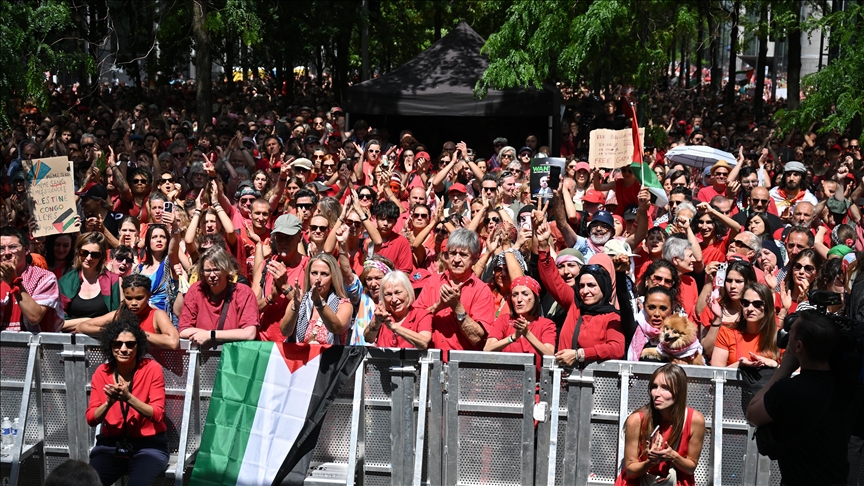Thousands rally in Brussels, demanding sanctions against Israel over Gaza genocide
Over 75,000 protesters dressed in red march through Belgian capital
 Protest against Israel in Brussels
Protest against Israel in Brussels
- Protestors condemn 'inaction and hypocrisy' of European governments, call for immediate concrete measures
BRUSSELS
More than 75,000 people marched through the streets of Brussels on Sunday dressed in red to symbolize a "red line" against Israel’s genocidal acts in Gaza.
The demonstration was supported by a wide range of organizations, including citizens' groups, unions, youth organizations, cultural centers and associations, drawing people from all over Belgium.
According to a count by the Brussels police, more than 75,000 protesters turned up, exceeding the initial expectation by 11.11.11, a Belgium-based umbrella organization dedicated to international solidarity.
Protesters who spoke to Anadolu made their demand clear: Sanctions must be imposed on Israel, as a red line has been crossed.
Event organizer Kenny Van Minsel from 11.11.11 demanded change from European policy makers.
"Today, we're gathering here with tens of thousands of people and more than 150 civil society organizations to demand change. We've seen a genocide being live-streamed for 20 months now on our screens, and we really don't want to condone that."
His criticism underscored the growing dissatisfaction with political inaction.
"There's too little action at the political level. They're not taking any concrete measures," he said.
He demanded "specific actions" from European governments and institutions, insisting that strong measures should follow their words of concern. Among the key demands were sanctions against members of the Israeli government -- particularly its far-right leadership -- and the enforcement of an arms embargo.
Calls for justice and freedom
Grace Shuqha, a woman of Palestinian heritage, condemned what she described as European hypocrisy.
"I’m actually half Palestinian. I'm here to support my people and to hopefully achieve their freedom one day," she said.
She demanded that European politicians "stop being so hypocritical just to stand their ground for once in their lives and to be on the right side of history."
The demonstration reflected a growing criticism from civil society groups in Belgium and across Europe against their governments' silence and inaction in the face of the humanitarian crisis in Gaza.
Protestors say the European Union and its members are failing to match their statements with decisive policy measures.
"I think it's really terrible…the terrible things that Israel is doing to the people in Gaza and the West Bank. And that really should stop," said Ragna Vranken. "I think the government, not only in Belgium, but also the EU, should really take action and sanction Israel."
Maroye Veronique called on Belgian leaders to respond to their constituents' demands.
"I can't accept anymore what is happening. And it's also a message to our politicians in Belgium: Stop. You have a people who want one thing, and you don't listen to your people. It's not okay anymore."
Taro Rutten, a 10-year-old girl who was present with her mother, insisted that the killing must stop immediately.
"They have to stop the war in Gaza and they have to punish Israel. We also want to say that this is where the red line is."
Growing pressure on Europe
As the death toll in Gaza climbs and reports of civilians stranded without food, water and electricity emerge daily, pressure is mounting on European governments to reassess their relationships with Israel and to pursue policy options including sanctions to help bring about a ceasefire.
Many accuse European governments and the EU of applying double standards and failing to take a firm stance against Israeli actions in Gaza.
The EU-Israel Association Agreement, in force since 2000, forms the basis for political, economic and sectoral cooperation between the two parties. It includes a human rights clause -- Article 2 -- which underscores that respect for human dignity and human rights is a key element of the relationship.
Rights advocates, civil society organizations and some European lawmakers say the EU's weak response to Israel’s alleged violations of international humanitarian law in Gaza highlights a longstanding bias in its policy. They argue that this inconsistency undermines the credibility of the EU's human rights commitments.
Some EU members including Ireland, Spain and Belgium have called for a formal review or temporary suspension of the agreement, saying it could be a powerful tool to pressure Israel to comply with international humanitarian obligations and pursue a ceasefire.
The European Commission and EU foreign policy chief Kaja Kallas are under growing pressure to activate the human rights clause.
However, divisions remain within the 27-member block with Germany, Hungary and Italy opposing punitive measures against Israel and insisting that dialogue must be maintained.








